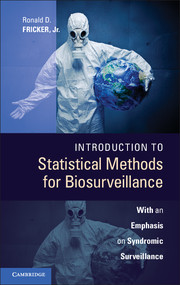2 - Biosurveillance Data
from Part I - Introduction to Biosurveillance
Published online by Cambridge University Press: 05 March 2013
Summary
An ounce of prevention is worth a pound of cure.
Benjamin Franklin (1706–1790)Biosurveillance is based on data but data that may come in many different forms and from many different sources. Most often, biosurveillance uses medical and health-related data. The data may be clinically well-defined and linked to specific types of outbreaks, such as groupings of ICD-9 diagnosis codes, or they may be less well-defined, such as syndrome counts based on emergency room chief complaint data or only vaguely defined and perhaps weakly linked to specific types of outbreaks, such as over-the-counter (OTC) sales of cough and cold medication or absenteeism rates.
Biosurveillance data may also be based on active air or water sampling. For example, the BioWatch program uses detectors that collect airborne particles onto filters that are subsequently sent to laboratories for analysis. As with syndromic surveillance systems, a goal is earlywarning of a pathogen release. Biosurveillance may also include agricultural and zoonotic data.
This chapter begins by describing the types of data used in biosurveillance, delving into the specific details of syndromic surveillance data using two sets of actual data.
Information
- Type
- Chapter
- Information
- Introduction to Statistical Methods for BiosurveillanceWith an Emphasis on Syndromic Surveillance, pp. 23 - 52Publisher: Cambridge University PressPrint publication year: 2013
